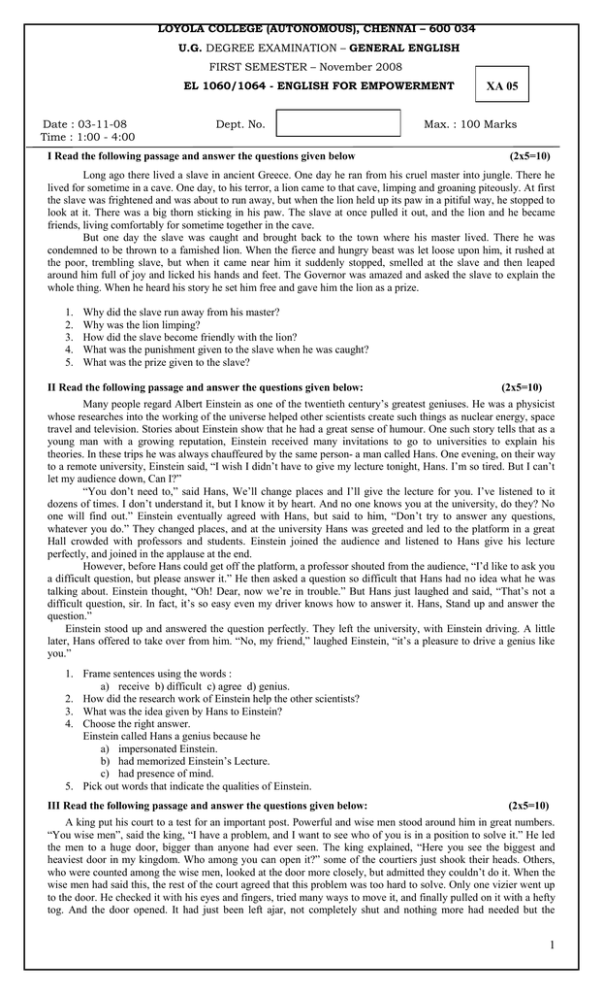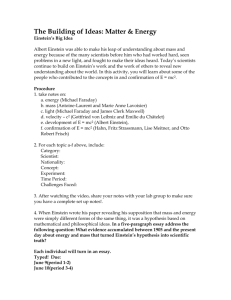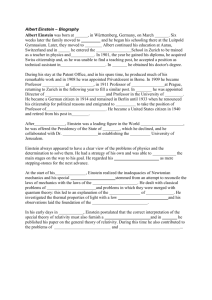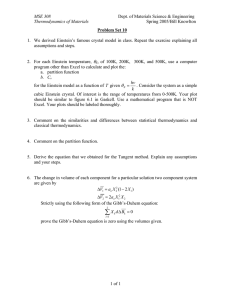LOYOLA COLLEGE (AUTONOMOUS), CHENNAI – 600 034 U.G.
advertisement

LOYOLA COLLEGE (AUTONOMOUS), CHENNAI – 600 034 U.G. DEGREE EXAMINATION – GENERAL ENGLISH FIRST SEMESTER – November 2008 EL 1060/1064 - ENGLISH FOR EMPOWERMENT Date : 03-11-08 Time : 1:00 - 4:00 Dept. No. I Read the following passage and answer the questions given below XA 05 Max. : 100 Marks (2x5=10) Long ago there lived a slave in ancient Greece. One day he ran from his cruel master into jungle. There he lived for sometime in a cave. One day, to his terror, a lion came to that cave, limping and groaning piteously. At first the slave was frightened and was about to run away, but when the lion held up its paw in a pitiful way, he stopped to look at it. There was a big thorn sticking in his paw. The slave at once pulled it out, and the lion and he became friends, living comfortably for sometime together in the cave. But one day the slave was caught and brought back to the town where his master lived. There he was condemned to be thrown to a famished lion. When the fierce and hungry beast was let loose upon him, it rushed at the poor, trembling slave, but when it came near him it suddenly stopped, smelled at the slave and then leaped around him full of joy and licked his hands and feet. The Governor was amazed and asked the slave to explain the whole thing. When he heard his story he set him free and gave him the lion as a prize. 1. 2. 3. 4. 5. Why did the slave run away from his master? Why was the lion limping? How did the slave become friendly with the lion? What was the punishment given to the slave when he was caught? What was the prize given to the slave? II Read the following passage and answer the questions given below: (2x5=10) Many people regard Albert Einstein as one of the twentieth century’s greatest geniuses. He was a physicist whose researches into the working of the universe helped other scientists create such things as nuclear energy, space travel and television. Stories about Einstein show that he had a great sense of humour. One such story tells that as a young man with a growing reputation, Einstein received many invitations to go to universities to explain his theories. In these trips he was always chauffeured by the same person- a man called Hans. One evening, on their way to a remote university, Einstein said, “I wish I didn’t have to give my lecture tonight, Hans. I’m so tired. But I can’t let my audience down, Can I?” “You don’t need to,” said Hans, We’ll change places and I’ll give the lecture for you. I’ve listened to it dozens of times. I don’t understand it, but I know it by heart. And no one knows you at the university, do they? No one will find out.” Einstein eventually agreed with Hans, but said to him, “Don’t try to answer any questions, whatever you do.” They changed places, and at the university Hans was greeted and led to the platform in a great Hall crowded with professors and students. Einstein joined the audience and listened to Hans give his lecture perfectly, and joined in the applause at the end. However, before Hans could get off the platform, a professor shouted from the audience, “I’d like to ask you a difficult question, but please answer it.” He then asked a question so difficult that Hans had no idea what he was talking about. Einstein thought, “Oh! Dear, now we’re in trouble.” But Hans just laughed and said, “That’s not a difficult question, sir. In fact, it’s so easy even my driver knows how to answer it. Hans, Stand up and answer the question.” Einstein stood up and answered the question perfectly. They left the university, with Einstein driving. A little later, Hans offered to take over from him. “No, my friend,” laughed Einstein, “it’s a pleasure to drive a genius like you.” 1. Frame sentences using the words : a) receive b) difficult c) agree d) genius. 2. How did the research work of Einstein help the other scientists? 3. What was the idea given by Hans to Einstein? 4. Choose the right answer. Einstein called Hans a genius because he a) impersonated Einstein. b) had memorized Einstein’s Lecture. c) had presence of mind. 5. Pick out words that indicate the qualities of Einstein. III Read the following passage and answer the questions given below: (2x5=10) A king put his court to a test for an important post. Powerful and wise men stood around him in great numbers. “You wise men”, said the king, “I have a problem, and I want to see who of you is in a position to solve it.” He led the men to a huge door, bigger than anyone had ever seen. The king explained, “Here you see the biggest and heaviest door in my kingdom. Who among you can open it?” some of the courtiers just shook their heads. Others, who were counted among the wise men, looked at the door more closely, but admitted they couldn’t do it. When the wise men had said this, the rest of the court agreed that this problem was too hard to solve. Only one vizier went up to the door. He checked it with his eyes and fingers, tried many ways to move it, and finally pulled on it with a hefty tog. And the door opened. It had just been left ajar, not completely shut and nothing more had needed but the 1 willingness to realize it and the courage to act boldly. The king spoke, “You will get the position at the court, for you don’t rely just on what you see or hear; you put your own powers into action and risk a test.” 1. 2. 3. 4. 5. Why did the king want to test his court? What was the response of some of the courtiers? What was the task given to the wise men? How did the Vizier win the test? What are the human resources that the vizier possessed? IV Read the following passage and answer the questions given below: (2x5=10) Pudur is a village, twenty kilometers from Chinglepet. About 500 people live there. All of them belong to the high caste.Vayalur is another small village, two kilometers from Pudur. The people of Vayalur belong to the low caste. There is a tank common to both the villages. The high caste people of Pudur take water from the tank. But the low caste people of Vayalur are not allowed to touch the water tank. If they want water, they must ask a high caste person to take the water from the tank and pour it into their pots. They must not touch the water. All the people of Pudur and Vayalur follow this rule. Revathi is a sixteen year old girl who is studying in the 12th standard in a school at Chinglepet. She is from Vayalur. After writing her examinations she returned to her village. One day she went to the tank to get water. When she arrived at the tank, there was nobody near the well. She took the water and as she returned, a man from Pudur appeared suddenly. He scolded Revathi and broke her pot. She started crying, returned home and informed her people. Meanwhile the people of Pudur gathered and marched towards Vayalur to punish them for touching the tank water. A quarrel broke out between the two villages. Finally the police was called to maintain law and order in the two villages. 1. 2. 3. 4. 5. Why do you think the Pudur people do not allow Vayalur people to touch the pond water? Give reasons. What is your opinion about the caste system of India? If you were a Police Officer what will you do to solve this problem. What should be the role of the Government to avoid such discriminatory practices? Bring out any four social evils of the Indian society. V Answer any four of the following questions in a paragraph in about 100 words each. 1. How does the environment get polluted? 2. What are your feelings and emotions after reading the story ‘The Mysore Lake’ 3. Make a list of complaints that parents make against their children. 4. Why is India poor? 5. Draw and describe the Johari Window. 6. Why and when do you pray? VI. Fill in the blanks with the correct answer. (4x5 = 20) (10x1 =10) 1. A newspaper editor fired Walt Disney because he __________(was lazy, did not do his work on time, lacked imagination) 2. The lesson ‘We are Equals’ is about _________ (Equality, Classroom, Self Confidence). 3. Beethoven was a great __________(basket ball player, composer, scientist) 4. The part of yourself which is known to you but not shared with others is_________ area of your life.(hidden, blind, dark) 5. The professor called the student _________(by name, ‘son’, brother) 6. The camel driver compares the knowledge of the Scholar to a ________(stone in the desert, pearl, precious stone) 7. The mullah was ___________(magician, preacher, sultan) 8. The wise Ali advised the boy to think of ___________(temptation, meditation, moderation). 9. The Cooum river is a __________ of the city.(boon, bane, benefit) 10. Yashoda publicly____________ (cursed, confronted, praised) the landlord whenever she saw him, in the village and even in court. VII Answer any two of the following questions in about 200 words each. (2x10 =20) 1. Do you justify the act of Ibrahim who auctioned his son at Illuppur. Take the role of the father and describe your feelings when you did so. 2. Compare yourself with the wanderer in ‘The Experience of Freedom’ and write how education gives people genuine freedom. 3. Describe the poverty of the camel driver and the arrogance of the scholar. Do you think the camel driver is wise? 4. Narrate the story of Yashoda’s fight against the landlord of Yacharam village and unearth the values found in the story. VIII Develop the following hints into a story. Give an appropriate title for your story. (10 marks) Three thieves…..good friends….steal a bag of money….go to a jungle….to share it. …..feel hunger…..one is sent to buy food….two of them wait…..an evil thought comes to their minds….plan to murder him…..one poisons the food….the other two murder the first…..the other two consume the poisoned food and die. 2 3





